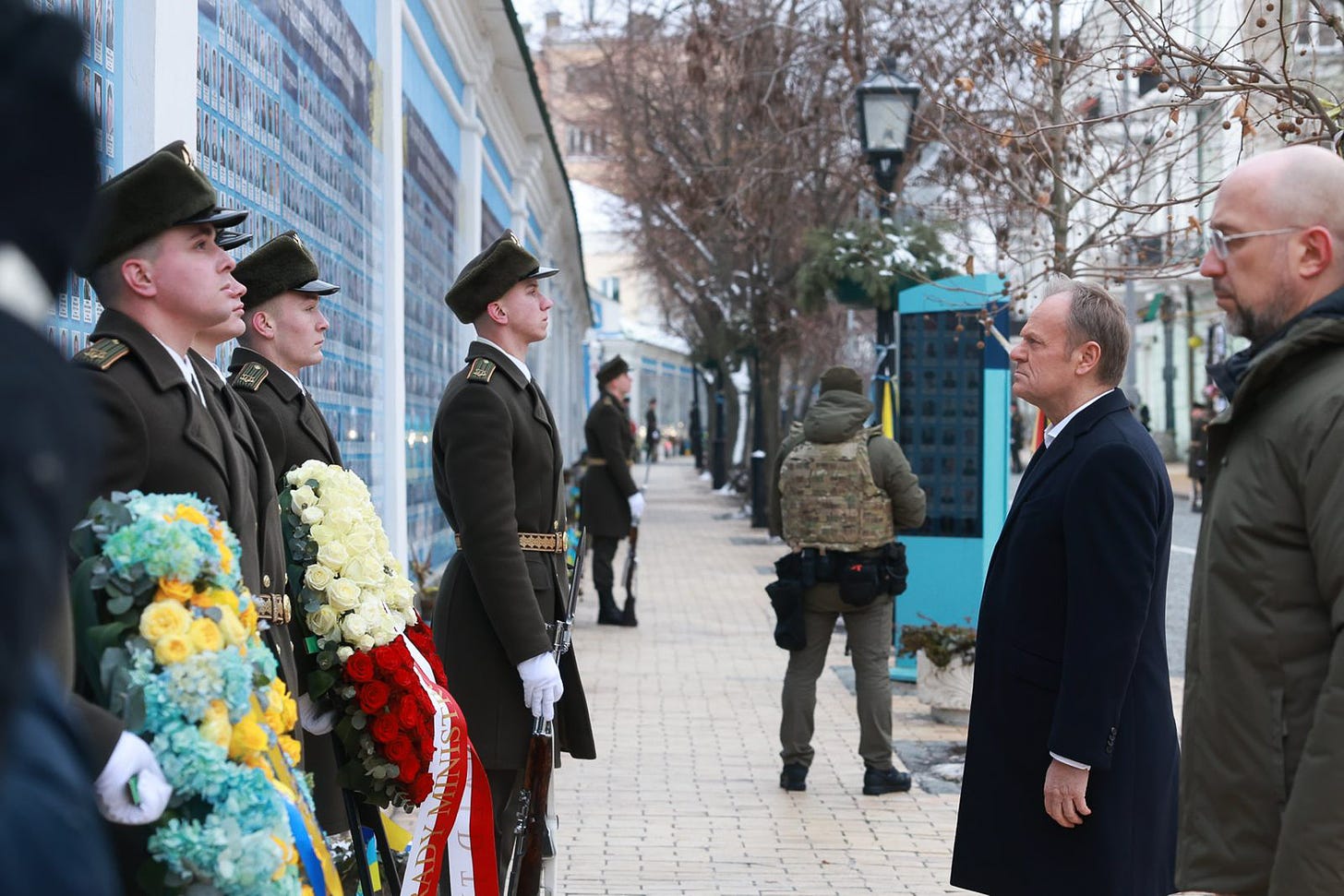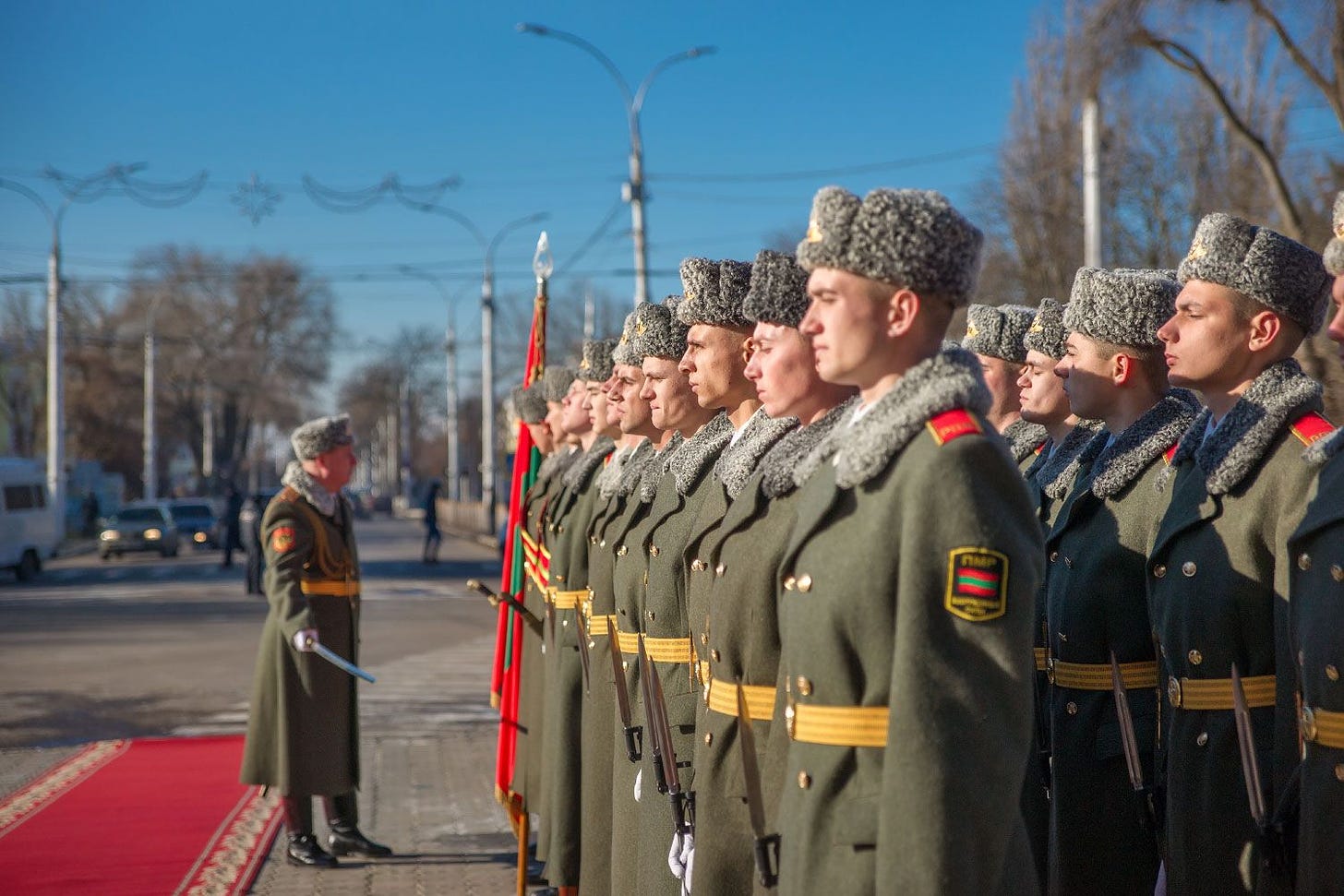Last Week in Eastern Europe: Feb. 19-25, 2024
Ukraine threatened retaliation against Poland over farmers' border blockade, Zelensky revealed Ukraine's troop death count, and Hungary greenlit Sweden's NATO accession

What You Need To Know:
This roundup combines last week’s top news with important underreported stories
1. The Poland-Ukraine border blockade crisis escalated as Kyiv threatened retaliation and saboteurs targeted Ukrainian grain
Ukrainian Prime Minister Denys Shmyhal stated on Saturday that the country may take “retaliatory measures” against Poland if the government does not stop Polish farmers’ ongoing blockade of the Polish-Ukrainian border in the next month. These statements came after Polish leaders failed to attend a meeting with Shmyhal about the protests on Friday, citing a previously planned meeting on March 28. Farmers’ protests against Ukrainian grain shipments intensified last week, with some individuals displaying pro-Putin and anti-Ukrainian signs while unknown saboteurs dumped 160 tons of grain out of Ukrainian trucks in Poland on Sunday. In response to the blockade, Polish PM Donald Tusk designated border crossings and railways as “critical infrastructure” to allow military and humanitarian aid to bypass the protests.
Why it matters: Resolving this crisis has become by far the most important issue in the Polish-Ukrainian relationship. Although the protesting farmers who displayed inflammatory signs were arrested, the ongoing protests and blockade, coupled with the mounting attacks on grain shipments, have deeply eroded trust between Ukraine and its key Polish ally, with Ukraine’s Zelensky calling them a “national security” risk. Not only have the protests endangered vital aid flowing from Poland to Ukraine, but they have also threatened Ukraine’s ability to safely export its grain through the EU, which is crucial for international food security. Additionally, Polish leaders themselves have warned the protesting farmers may be influenced by “Russian agents,” adding another deeply concerning wrinkle to the growing problem.
2. Zelensky revealed Ukrainian troop casualty numbers for the first time and stated Kyiv’s counteroffensive plans were leaked to Russia
For the first time since February 2022, Zelensky stated on Sunday that around 31,000 Ukrainian soldiers have been killed during Russia’s invasion of the country, while declining to give numbers on troop injuries. Zelensky’s number is much lower than the 70,000 figure the US has previously cited. The same day, Zelensky also revealed that Russia had obtained Ukraine’s plans for its failed summer counteroffensive last year, and stated Russia is planning to launch a new offensive as soon as May 2024.
Why it matters: The Ukrainian government had previously kept quiet about its casualty rates, but Zelensky appears to have been compelled to reveal these comparatively low estimates as a way to signal to Western allies that its military turnover rate is lower than has been reported and that its capacity to defend itself remains sustainable, thus incentivizing desperately needed military aid. The information about the leak of Ukraine’s counteroffensive plans may have been released for similar reasons as a way to underscore that its failure was not due to a lack of military effectiveness — but also revealed just how many inroads Russia still has within Ukraine’s military structure.
3. Hungary agreed to ratify Sweden’s NATO membership after striking a deal to receive additional Swedish fighter jets
After weeks of delays, Hungary’s PM Viktor Orbán finally opened the door on Friday for Sweden to join NATO after Swedish PM Ulf Kristersson agreed to send Hungary four additional Gripen fighter jets and announced that their manufacturer, Saab, would open an AI research center in Hungary. Orbán previously stated he was no longer opposed to Sweden’s membership, but had dragged his feet on ratifying it until Kristersson agreed to personally come to Budapest to negotiate with him. Hungary’s lawmakers in Parliament are expected to approve Stockholm’s membership today.
Why it matters: If Hungary’s legislators ratify Sweden’s accession as expected, Hungary will become the last NATO country to do so after 21 months of stalling, allowing Sweden to join the alliance. This dealmaking around the ratification process is yet another example of Orbán leveraging politics in NATO and the EU for rather meager and ego-driven gains, as he did during EU efforts to approve an aid package for Ukraine several weeks ago. Orbán has long been the most pro-Russian leader in both blocs, and has opposed other European countries’ policy of support for Ukraine.

4. Leaders in Moldova’s Russia-backed breakaway state Transnistria announced they will ask Putin for annexation
On Wednesday, the government of Transnistria, a breakaway republic that is internationally recognized as part of Moldova, announced its representatives would meet with Russia’s Vladimir Putin to reaffirm its desire to be annexed by Russia. Although the leaders of the Russian-backed, self-proclaimed state have denied it, the Institute for the Study of War has warned that Transnistria may organize a referendum on integration into Russia on Feb. 28, although Ukrainian military leaders have poured cold water on this scenario. Russia had previously threatened Moldova with a “military scenario” over any efforts to restore its control over the territory.
Why it matters: Transnistria has never made any secret of its desire to unite with Russia since the breakup of the USSR, but the special congress that has been called for Feb 28 has not met since 2006, which may make Transnistria’s potentially quite significant. Even though practically speaking there is no way for Russia to annex the territory since it lies between Ukraine and Moldova, a referendum on annexation would give Putin another opportunity to stage provocations or wage hybrid warfare on Moldova as it seeks to join the EU and integrate economically with the bloc.
5. Belarus held its first elections since the internationally condemned 2020 vote, this time without any opposition candidates
Belarus held parliamentary elections on Sunday for the first time since 2020, when Belarusian leader Alexander Lukashenko fraudulently declared victory and cracked down on anti-government protests in the country, forcing the Belarusian opposition to flee abroad. This time though, the only parties running in the elections were ones that are loyal to the leader, leading Belarusian opposition leader Sviatlana Tsikhanouskaya, who is based in Lithuania, to call for a boycott of the vote.
Why it matters: Although the results of the election were a foregone conclusion, they were the first elections held in either Belarus of Russia since Moscow’s invasion of Ukraine, and Lukashenko’s ability to pull them off was likely seen by the Kremlin as a litmus test of his durability amid sanctions and political pressure from the West. Russia, which is Lukashenko’s primary patron and ally, is set to hold similarly rigged presidential elections later this year.
Other trends to watch:
— Estonia’s Foreign Minister Margus Tsahkna stated on CNN that Estonia had recently apprehended 10 Russian agents in the country, accusing them of attacking the Interior Minister’s car.
— The European Commission announced on Friday that it is set to start unblocking 100 billion euros in funds for Poland this week that have been frozen for years due to rule of law concerns under the country’s previous populist government.
— Romanian President Klaus Iohannis announced on Thursday that he would challenge Mark Rutte, the Prime Minister of the Netherlands, for the position of NATO’s Secretary General. Rutte already has the backing of the US, the UK, France, and Germany, and is considered the favorite for the role.
— Thousands of people protested in Slovakia on Wednesday to mark the anniversary of the killing of a journalist and his fiancé in the country in 2018. The political scandal around the murders led to the collapse of the government of Slovak PM Robert Fico, who has since returned to power last year.



